- Home
- Nnedi Okorafor
Sunny and the Mysteries of Osisi Page 5
Sunny and the Mysteries of Osisi Read online
Page 5
I am about three years old. See me there beside the tree, sulking. The brown-skinned, naked little girl with a bracelet made from tiny shells, found near the seaside. My arms are around my chest, my chin to my neck. Even having been raised by baboons, I still exhibit human traits. I know I am human. They made sure I understood that. The Idiok do not believe in lies. It is two weeks before the seventeen-year-old boy who would become my father would find me. I was happy the day before, but this day I am not.
I am so young, but Ghost has shown me the faces of my parents. I’ve seen humans before, from afar, as they drive past in their cars or hurry past our forest. I’ve listened to them speak and even picked up some of their words, to the Idiok’s delight. But when Ghost made those signs before my face, something happened to me. I began to recall how I got there. I believe my parents were murdered. And this is why I am sulking. It is too much for someone as small as me.
However, stand here. Watch me. I will not stay upset for long. I am a young child and the world is beautiful to me. But I will remember. That is one of the powers of Nsibidi. Memory. When you close this book, think of—
“Sunny!” her mother called.
Sunny came back to herself and leaned against her bed’s pillow, her copy of Sugar Cream’s Nsibidi: The Magical Language of the Spirits on her lap. She could smell the fresh leaves and pure dirt. It was warm and humid, and a breeze was blowing. She could hear the calls and chirps of strange birds. But the human mind often denies when it can’t understand. How can baboons teach a magical language? she wondered. It was ridiculous. The entire book was all ridiculous, but cool, too. She’d ask Sugar Cream directly about this. And maybe she’d ask about Ghost and the Mami Wata baboon. And maybe she’d ask how one even writes a book in Nsibidi. She laughed. Sugar Cream had very strange origins, indeed. And “reading” about it was making Sunny feel equally strange. She yawned. Her body felt sluggish and thick.
“Sunny?!” her mother said, opening her door.
“Yes, Mum.”
“Chukwu’s leaving. Come say goodbye.”
“Oh!” Sunny said. She’d been so wrapped up in her book that she’d lost track of time. Had two hours passed already? She slowly got out of bed, closing her eyes for a moment and then opening them. She shook herself. “Wake up, Sunny,” she said. She jumped up and down. It helped, but not much. She’d been “reading” her Nsibidi for two hours. Nothing could chase away the fatigue but a nap. She’d have to play it off.
Sunny’s brother’s Jeep was full of suitcases. “I can’t wait,” Chukwu declared. “First semester, I’ll have chemistry and biology classes. I will show them what I am made of.” His best friend, Adebayo Moses Oluwaseun, sat in the passenger seat. The two had been friends for years, but in the last year they’d become inseparable. Both were good soccer players, though Sunny’s brother was easily better. And both had discovered weightlifting at the same time.
“I was going to say that you should watch for armed robbers on the road, but you two look too dangerous to bother.” Their father laughed.
Adebayo flexed a muscular arm. “No bullet can penetrate my flesh,” he said.
Chukwu laughed hard, and they both exchanged a look, sharing some sort of inside joke.
“Just drive carefully and quickly,” Sunny’s mother said. “Get to campus before dark.”
“Mummy, campus is a half hour away,” Chukwu said. “It’s morning.”
“Better to be safe,” she said.
“Sunny,” Chukwu said, smirking. “Stay out of my room.”
“As if I have a reason to want to go in that smelly place,” she said, leaning against the house. Her legs felt so weak. She sat down on the curb, gazing at her brother. He was really going off to university. “Wow,” she said to herself.
“Ugonna, stay away from my side of the room,” Chukwu said, waving a dismissive hand at Sunny.
“Your room?” Ugonna said. “You don’t have a room anymore, and I have a big one.”
“We’ll see about that when I visit for Christmas,” Chukwu said, starting the Jeep.
“Call when you get there,” their mother added, opening the door and hugging him in the driver’s seat.
“Study hard, my son,” his father said, clapping him on the shoulder.
Sunny leaned to the side, her hand in the dirt, as they all watched him drive through the gate onto the road. Then he was gone. Sunny frowned, her mind jumping to what she’d just “read” in her Nsibidi book, that the Idiok who’d adopted Sugar Cream were Baboon Leopard People, and they all had the same name as their spirit faces. That is just… bizarre, she lazily thought. Then she laughed and slowly got up. Good luck, Chukwu.
7
THE NUT
Later that day, Sunny dribbled the soccer ball between her bare feet as she ran towards Ugonna. She moved it faster and faster the closer that she got to him. As she approached, Ugonna prepared to challenge her. As she did so, she watched his face shift from smiling to frowning.
“Damn,” he exclaimed.
She kicked the ball to the left when she got to him, doing a quick whirl and catching it easily as she shot around him. “Damn it!” he exclaimed, turning around to watch her.
She slowed down, working the ball with her feet. She flipped it onto the top of her foot and tapped it three times. Then she bopped it to her knee where she bounced it.
“Maybe you should try out for Arsenal.”
Sunny’s smile grew even broader. “For the men’s team?” She popped the ball onto her head and then back to her feet. Then she kicked it to her brother.
“You can show them how to make an exception,” he said, clumsily dribbling the ball between his feet.
“Maybe,” she said, looking up at the shining evening sun. She’d gotten her Leopard teammates at the Zuma Cup in Abuja and then the group of boys from school to make exceptions, who said she couldn’t do it a third time? “Maybe.”
A car pulled up to the gate. It was Uncle Chibuzo, their father’s oldest brother. He drove his shiny green BMW into the compound and parked it beside their father’s black Honda.
“Ugonna, Sunny, how are you?” he asked, hopping out.
“Fine,” they both said, each giving him a hug.
“How is school? Studying hard?”
“Yes, sir,” Ugonna said.
“Always,” Sunny said.
“I hear your brother went off to university today.”
“Yes,” Ugonna said. “He’s probably meeting his hostel mates right now.”
“You should be proud.”
“We are,” Sunny said. She gently kicked the soccer ball up, kneed it, and caught it in her hands.
“You are pretty good,” Uncle Chibuzo said. “You want to be like your older brother?”
“No,” Sunny said. “He’s not as good as me.”
Uncle Chibuzo laughed heartily. Too heartily. Pff, he has no idea, Sunny thought, annoyed. She wished he’d been there when she’d scored five goals in a row last week playing with her classmates.
“This way,” Ugonna said, taking the lead.
Their father had been expecting their uncle, and he was already waiting in the living room. As they greeted each other, slapping hands and laughing, Sunny and Ugonna tried to sneak away.
“Sunny,” Uncle Chibuzo said, “bring kola.”
Ugonna silently laughed, covering his mouth. And as Sunny turned away, she rolled her eyes. The ceremony of breaking the kola nut, more simply called “breaking kola,” always relegated her to servant because she was always the youngest girl in the house. “Whatever,” she muttered, going to the kitchen.
She placed a kola nut on the small wooden plate. Then she added a large dollop of peanut paste and a small pile of alligator pepper on the side. She brought it out to her uncle and father and tried her best not to look as irritated as she felt.
“Ah, kola has come,” her uncle ceremoniously said, smiling wide with all his teeth.
“Very good,” her father added.
Ugonna just stood there, clearly as impatient to have this over and done with as Sunny. She stood before her uncle because the kola was always presented to the oldest man in the room. She held the plate steady so that the balls of alligator pepper wouldn’t roll off.
“Look at you presenting it like a miserable human being,” her uncle snapped. “Wake up. This is not just something your elders do. It’s an important ritual. You young people don’t know anything.”
Sunny wanted to heavily protest. She wanted to say that she knew more old ways than he ever would. She’d faced real masquerades and had her own juju knife, for goodness sake.
“Kola is important,” her uncle said. “Not just to Igbo, to all Nigerians. The Yoruba grow it, the Hausa chew it, Igbos talk and talk about it. For us, Ndi Igbo people, the kola nut, the oji, symbolises pure intention. It connects us to our ancestors. Oji is the channel of communication beyond the physical world and into the spirit world. Nothing starts without breaking kola.”
He picked up the pinkish-yellow kola nut and broke it into four parts. “Four lobes,” he said. “Very good.”
He took a piece, scooped up some peanut paste with it, then some alligator pepper, and handed the plate back to Sunny as he ate it. Sunny next offered the plate to her father who did the same. When she served Ugonna, she refused to look at his smirking face. If he had been younger than her, she’d still have had to serve him, for maleness outdid age in Igbo culture. Ridiculous, Sunny thought as she always did when she got stuck serving the kola nut when her father had visitors.
She took her piece, dipped it into the peanut paste and then the pepper, and angrily crunched the combination. The bitter taste came from the fact that kola was full of caffeine. It used to be the ingredient in Coca-Cola that gave it its flavour and caffeine. The bitterness, the heat of the pepper, and the peanut flavour was always an explosion to her taste buds. She focused on that instead of her irritation.
Sunny studied well into the night, riding the caffeine wave of that one piece of kola nut. When she finished, she brought out the box from beneath her bed and opened it. Her kola nut buzz gave a kick to her curiosity. I wonder, she thought, bringing out the sheet of Nsibidi. She put it down, turned off by the idea of vomiting kola nut if she tried to read it. Then she picked it up again. She took a deep breath and then quickly unfolded it.
She looked at the symbols and nothing happened. She sighed, irritated. Nothing happening was even worse than feeling the nasty nausea. “Great,” she muttered, still straining to “read” the Nsibidi. “Now I don’t even—” The symbols started shifting. Her belly flipped with surprise; she grasped the sheet more tightly. “They’re looking back at me,” she whispered, feeling her lips go numb and her ears begin to plug up. She was being thrust high into the air or deep into the water. There was a strange smell, but it wasn’t unpleasant. The smell was sweet and grassy—oily, too. Her belly rumbled and roiled.
Then Sunny heard the voice of her only Leopard relative, who’d been so powerful and loved and secretive and then brutally slain by her best student Black Hat Otokoto. Sunny’s belly stopped rioting, the rising nausea disappearing. Her grandmother sounded almost exactly like Sunny’s mother. The same high voice and rapid way of speaking. Then a strange place opened before Sunny—a city with beautiful stone buildings all etched with intricate designs. Mosaics, engravings, stone that contained mineral veins in natural, colourful, fractal patterns. Tall buildings that stretched high into the sky, but the buildings were rivaled by equally ambitious and strong trees, some palm, some more like fat baobab trees and hefty ebony trees. The roads were red packed dirt. And there was a small sunflower-yellow stone house with a stone roof…
The House is here. Yes, it smells like flowers, too. This surprises me. I love flowers. Everything here is stone, built to last. If it is wood, the trees will take offence and then take it apart. The winds can be strong in this place when it rains. A house must be solid and heavy, too. The front door is round and made from the wing of a giant Ntu Tu beetle. It’s clearer than glass but won’t break no matter what you do to it. That door is old, but it is not the oldest part of the house. Inside, you will find books, you will find heat, and flowers that have grown on the ceiling since the house was built.
Sunny, this is a place where if you seek, you will find. It took me years to find it. Maybe you will need to do the same at some point. If you are what I know you are, your life will not be easy, and there will be much that you have to answer to. But for now, you relax and see this place. See the street that leads to it. See the front door. And there is so much inside.
The floors are a mosaic that you can stare at for hours and think about the world. See the palm tree that grows through the centre of the house? There is a clear roof that protects the opening from water when it rains. Come this way to the library. It smells of sandalwood all the time, and the walls are covered with amulets. The acoustics here bring any kind of music to life just as strongly as the words in these books bring ideas and stories to life. To learn is to live.
When the Nsibidi let her go, she was looking blankly at the bottom of the page. She could still smell sandalwood. What a beautiful place that was, she thought, lying back. “I want a place just like that when I grow up,” she whispered. “Just like that.” But what did it all mean? Why would her grandmother write a page of Nsibidi about this place? She hadn’t even told Sunny where it was and whose place it was. Maybe it’s something she wants me to read when I’m under stress, Sunny thought. The fatigue that resulted from “reading” the powerful Nsibidi was tugging at her eyelids. She put the page away and closed the box. Then she lay in her bed. So relaxed. For several minutes, she thought about the house that sat in the strange city. Maybe Grandma was a fiction writer, Sunny thought with a chuckle. Fiction written in Nsibidi, it would be better than a motion picture. She chuckled some more. It was well past three o’clock. As her eyes drifted shut, she hoped she’d dream about the beautiful house.
But she didn’t.
Within minutes, she was dreaming…
She was in soft, warm water. Not choppy and rushing like when she was in the river during her initiation. No, this place was calm and blue, but she could feel its weight as she moved through it. And she could breathe here. She sped up. Her body seemed to know where it was going even if her mind did not. Faster and faster until the blue of the water became the blue of the sky.
She was flying. The rush of the cool air against her face took her breath away. She was high above a great forest, a rain forest. Mist moved through the trees like clouds that were too lazy to float. Then in the distance she saw it. A city of smoke. Burning so hot the buildings looked otherworldly. “Noooo!” she screamed, trying to stop herself. But she couldn’t stop. She just kept hurtling towards it. She was going to burn, too…
She was falling. She was jarred awake by her body hitting the floor, again. “Oof!” She blinked in the dark, her eyes adjusting. She looked around her room and sat up. A bed, a dresser, a closet. There was a rolled-up newspaper on the floor. She felt a moment of panic. She couldn’t remember her own name. “Who am I?” she whispered, frowning.
She could not remember. The room was nice, comfortable, and pleasing to her eye, but it was foreign. Where am I? What is all this? She got up, fighting panic. The bed had yellow-and-rose-coloured sheets that she’d pulled half off when she’d fallen out. She looked down at her legs and frowned. Her skin was so pale. There was a flat-screen computer monitor on the desk and a small computer box on the floor beside it. Schoolbooks were also on the floor. Yes, those were schoolbooks.
As she looked around the room, unsure of who or where she was, she began to remember other things. The wilderness. Like an impossible wonderful jungle full of… everybody… but the living. Mostly green, but every other colour and kind dwelled there, too. The wilderness made the physical world seem flat, dead, and quiet. “Ekwensu,” she whispered. And when she spoke the name of the powerful terrifying masquerade who’d
nearly killed her and her friends a year ago, she felt a deep anger rise in her. She hated no one; she didn’t have the propensity for hatred. Nevertheless, the one who held that name was one she wanted to send to the darkest corner of the universe.
Her eye fell on the top of the wooden cabinet beside her window. She blinked. Then she burst out laughing. She sat down on her bed, her eyes still glued to the top of her dresser, and she laughed even harder. As she laughed, it was as if her spirit flew into her and filled her up; everything returned—her memories, her destiny, her self. She was Sunny Nwazue and she was Anyanwu. She was the daughter of Kingsley and Ugwu Nwazue and granddaughter of Ozoemena of the Nimm Warrior Clan. She was a Leopard society free agent, initiated over a year ago and witness to the suicide of the ritual killer Black Hat Otokoto and the banishment of the evil Ekwensu. And she was a most excellent soccer player.
Sunny was laughing because her wasp artist Della (gifted to Sunny by a market trader the year before) had created a brand-new sculpture out of some of the Oreo cookies in her backpack, a perfect replica of a stern-looking… Batman. As she watched and laughed some more, Della used a skinny leg to add one last flourish—a realistic sneer to Batman’s lips probably made from the Oreo’s cream.
Her belly cramped as she tried to stifle her giggles. She knew exactly where the large blue wasp had gotten its inspiration. She’d been reading her brother’s copy of Batman: Death by Design, which their uncle had sent him from the UK. There it was on the floor beside her schoolbooks.

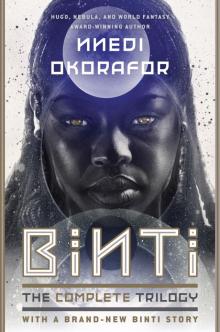 Binti, The Complete Trilogy: Binti ; Home ; The Night Masquerade
Binti, The Complete Trilogy: Binti ; Home ; The Night Masquerade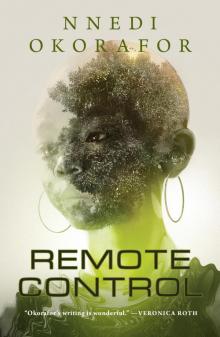 Remote Control
Remote Control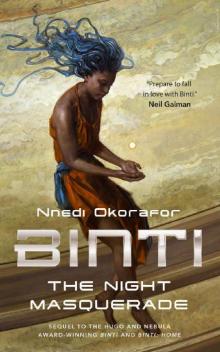 Binti: The Night Masquerade
Binti: The Night Masquerade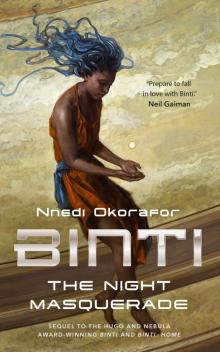 Binti--The Night Masquerade
Binti--The Night Masquerade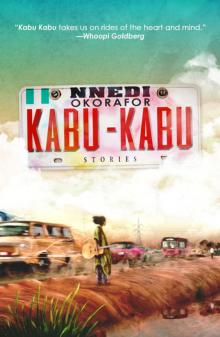 Kabu Kabu
Kabu Kabu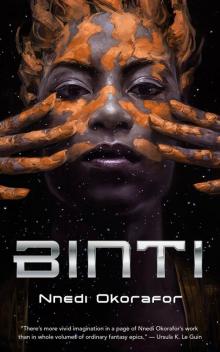 Binti
Binti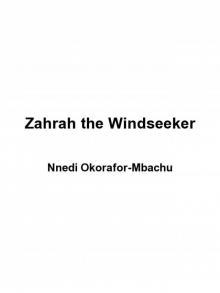 Zahrah the Windseeker
Zahrah the Windseeker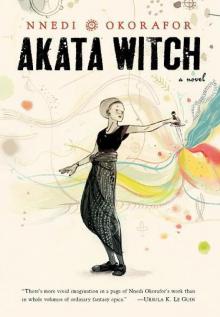 Akata Witch: A Novel
Akata Witch: A Novel Ikenga
Ikenga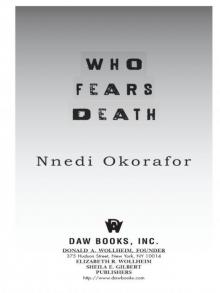 Who Fears Death
Who Fears Death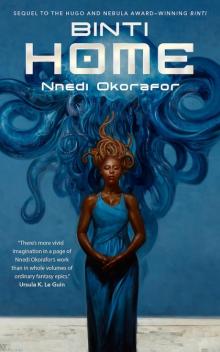 Binti--Home
Binti--Home Lagoon
Lagoon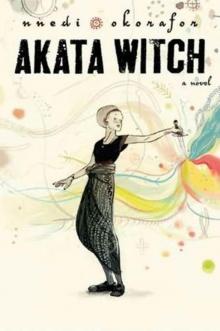 Akata Witch
Akata Witch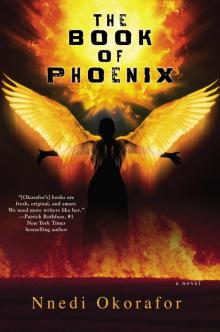 The Book of Phoenix
The Book of Phoenix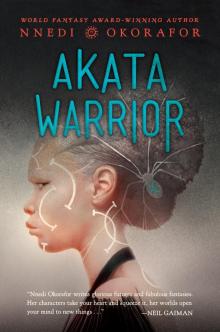 Akata Warrior
Akata Warrior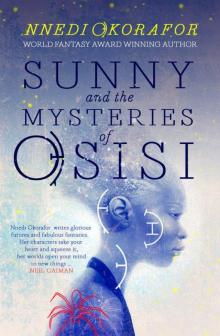 Sunny and the Mysteries of Osisi
Sunny and the Mysteries of Osisi